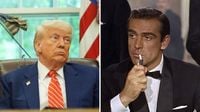In a series of controversial remarks, former President Donald Trump has stirred significant discussion regarding his administration's tariffs and their implications for various industries, including film and shipping. During a recent press conference, Trump addressed the sharp decline in shipping to the United States following the imposition of tariffs, stating simply, "it's good." This statement was met with skepticism by many in the business community, including CEO Ross Gerber, who expressed concerns about the potential long-term effects on the U.S. economy.
Trump's comments come at a time when the global economic landscape is shifting, and the unpredictability of U.S. economic policy is raising alarms. Creon Butler, Director of Global Economy and Finance at Chatham House, spoke at the Advantage Oman Forum, emphasizing the need for stability and targeted investment in sectors like tourism and green energy. These sectors are seen as critical for long-term economic growth, particularly in countries like Oman, which are seeking to diversify their economies.
In a more theatrical turn, Trump also discussed his plans to impose 100 percent tariffs on films made outside the U.S. He declared that the American movie industry is "DYING a very fast death," attributing this decline to incentives offered by other countries to lure filmmakers away from Hollywood. He described this trend as a "concerted effort by other nations" that poses a national security threat, asserting that the U.S. must take action to protect its film industry.
During the same press conference held on May 8, Trump assured that the iconic James Bond franchise would be exempt from these tariffs. He stated, "But James Bond has nothing to worry about, that I can tell you," referencing his friendship with the late Sean Connery, who he claimed played a pivotal role in helping him secure zoning for his golf courses in Aberdeen. This connection to Connery, a beloved figure in the film industry, seemed to underscore Trump's desire to maintain a favorable relationship with the franchise.
Trump's remarks about the film industry came on the heels of his announcement regarding a UK-U.S. trade deal, which aims to reduce tariffs on British goods. As part of this deal, he reiterated his commitment to imposing tariffs on foreign-produced films, claiming that many filmmakers have left the country. Trump emphasized the need to bring them back, stating, "They all live here, the money comes from here, everything comes from here, but they make them in other countries. So, we’re gonna do something to bring them back, maybe to a large extent." However, the specifics of how these tariffs will be implemented remain unclear, particularly concerning U.S. productions that are partially filmed overseas.
Industry insiders have expressed confusion and concern over Trump's statements. The film industry is already undergoing significant changes, with the next James Bond film being produced by Amy Pascal and David Heyman. Courtenay Valenti and Sue Kroll from Amazon MGM have also affirmed their commitment to honoring the legacy of the James Bond character while introducing a fresh narrative for audiences worldwide. The anticipation surrounding the casting of the next Bond actor adds another layer of complexity to the ongoing discussions about tariffs and their impact on the film industry.
As Trump's tariffs continue to create uncertainty in both the shipping and film sectors, the broader implications for the U.S. economy remain a topic of heated debate. Critics argue that such policies could further isolate American industries from global markets, while supporters contend that they are necessary to protect domestic jobs and businesses. The tension between these perspectives highlights the challenges faced by policymakers in navigating the complexities of international trade and economic strategy.
In conclusion, Trump's recent remarks regarding tariffs have sparked a wave of reactions across various sectors, including shipping and film. As the former president continues to advocate for protective measures, the long-term consequences of these policies will likely shape the future of American industry and its position in the global market.




